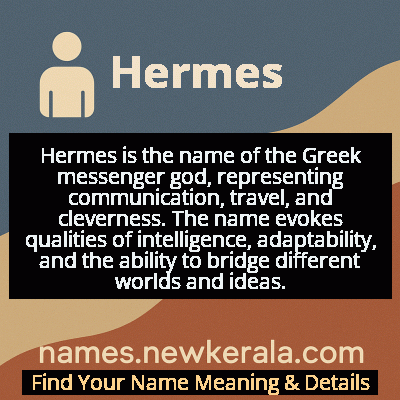Hermes Name Meaning & Details
Origin, Popularity, Numerology Analysis & Name Meaning of Hermes
Discover the origin, meaning, and cultural significance of the name HERMES. Delve into its historical roots and explore the lasting impact it has had on communities and traditions.
Name
Hermes
Gender
Male
Origin
Greek
Lucky Number
5
Meaning of the Name - Hermes
Hermes is the name of the Greek messenger god, representing communication, travel, and cleverness. The name evokes qualities of intelligence, adaptability, and the ability to bridge different worlds and ideas.
Hermes - Complete Numerology Analysis
Your Numerology Number
Based on Pythagorean Numerology System
Ruling Planet
Mercury
Positive Nature
Adventurous, dynamic, curious, and social.
Negative Traits
Restless, impatient, inconsistent, prone to indulgence.
Lucky Colours
Green, white.
Lucky Days
Wednesday.
Lucky Stones
Emerald.
Harmony Numbers
1, 3, 9.
Best Suited Professions
Sales, marketing, travel, entertainment.
What People Like About You
Versatility, charisma, adventurous spirit.
Famous People Named Hermes
Hermes Trismegistus
Legendary philosopher and alchemist
Central figure in Hermeticism, author of the Hermetic Corpus
Hermes of Aenos
Ancient Greek athlete
Olympic champion in stadion race, multiple Panhellenic victories
Hermes Pan
Choreographer and dancer
Principal choreographer for Michael Jackson, worked with numerous celebrities
Hermes Rodrigues da Fonseca
Brazilian President
8th President of Brazil (1910-1914), military leader and politician
Name Variations & International Equivalents
Click on blue names to explore their detailed meanings. Gray names with will be available soon.
Cultural & Historical Significance
In the Hellenistic period, Hermes evolved into Hermes Trismegistus, blending Greek and Egyptian traditions to become the foundational figure of Hermetic philosophy, which would profoundly influence Western esotericism, alchemy, and Renaissance thought. During the Renaissance, Hermetic texts inspired scientific inquiry and philosophical exploration, with figures like Marsilio Ficino and Giordano Bruno drawing on Hermetic wisdom. The name continued to resonate through the ages, appearing in literature, art, and eventually popular culture, maintaining its association with intelligence, movement, and boundary-crossing. His enduring legacy reflects humanity's fundamental need for connection, communication, and safe passage through life's various transitions.
Extended Personality Analysis
Individuals named Hermes are typically associated with exceptional communication skills, intellectual agility, and a natural talent for mediation and negotiation. They possess quick wit, adaptability, and the ability to navigate complex social situations with grace and charm. Like their mythological namesake, they often demonstrate entrepreneurial spirit, curiosity, and a talent for finding innovative solutions to problems. Their personality tends to blend cleverness with practicality, making them effective in business, diplomacy, or creative pursuits. The Hermes personality is characterized by mental dexterity and a love for movement—whether physical travel or intellectual exploration.
They may exhibit restlessness and a need for variety, often thriving in environments that allow for flexibility and change. While their cleverness can sometimes manifest as cunning or trickery, it's typically employed for constructive purposes rather than malicious intent. They value freedom and independence, resisting constraints that limit their ability to move between different social circles, ideas, or physical locations. Their natural charm and persuasive abilities make them effective communicators who can bridge divides and bring people together. However, this same adaptability can sometimes lead to perceptions of inconsistency or lack of deep commitment, as they prefer to keep their options open and maintain multiple interests and connections simultaneously.
Modern Usage & Popularity
In contemporary times, Hermes remains a distinctive and intellectually evocative name that carries strong mythological weight without being overwhelmingly common. Its usage is most prominent in Greece and among families with Greek heritage, though it has gained some international appeal among parents seeking classical names with strong character. The name maintains a sophisticated, artistic aura, often chosen by educated parents who appreciate classical literature and mythology. While never reaching mainstream popularity charts in English-speaking countries, it has seen steady usage among intellectual and artistic circles. The luxury brand Hermès has contributed to the name's association with elegance and craftsmanship, though this commercial connection hasn't significantly impacted naming trends. In recent decades, there's been a slight increase in usage as part of the broader trend toward mythological names, particularly among parents looking for names that are both traditional and distinctive. The name continues to convey intelligence, sophistication, and a connection to classical wisdom.
Symbolic & Spiritual Meanings
Hermes symbolizes the fundamental human experiences of transition, communication, and boundary-crossing. As the god of thresholds, he represents the spaces between different states of being—the mediator between divine and mortal, living and dead, known and unknown. His symbolism extends to intellectual and spiritual journeys, representing the mind's ability to traverse different realms of thought and understanding. The caduceus, his iconic staff entwined with serpents, has become a universal symbol of commerce, negotiation, and in modern times, medicine and healing. Hermes embodies the principle of exchange—not just of goods in commerce, but of ideas in conversation, souls in transition, and information in communication. He symbolizes cleverness and adaptability, the quality of being able to navigate complex situations through wit and intelligence rather than brute force. His role as psychopomp, guide of souls to the afterlife, adds a deeper symbolic layer of spiritual guidance and safe passage through life's ultimate transition. Ultimately, Hermes represents the connective tissue of existence—the forces and faculties that allow separate entities and realms to interact, communicate, and transform through their encounters.

